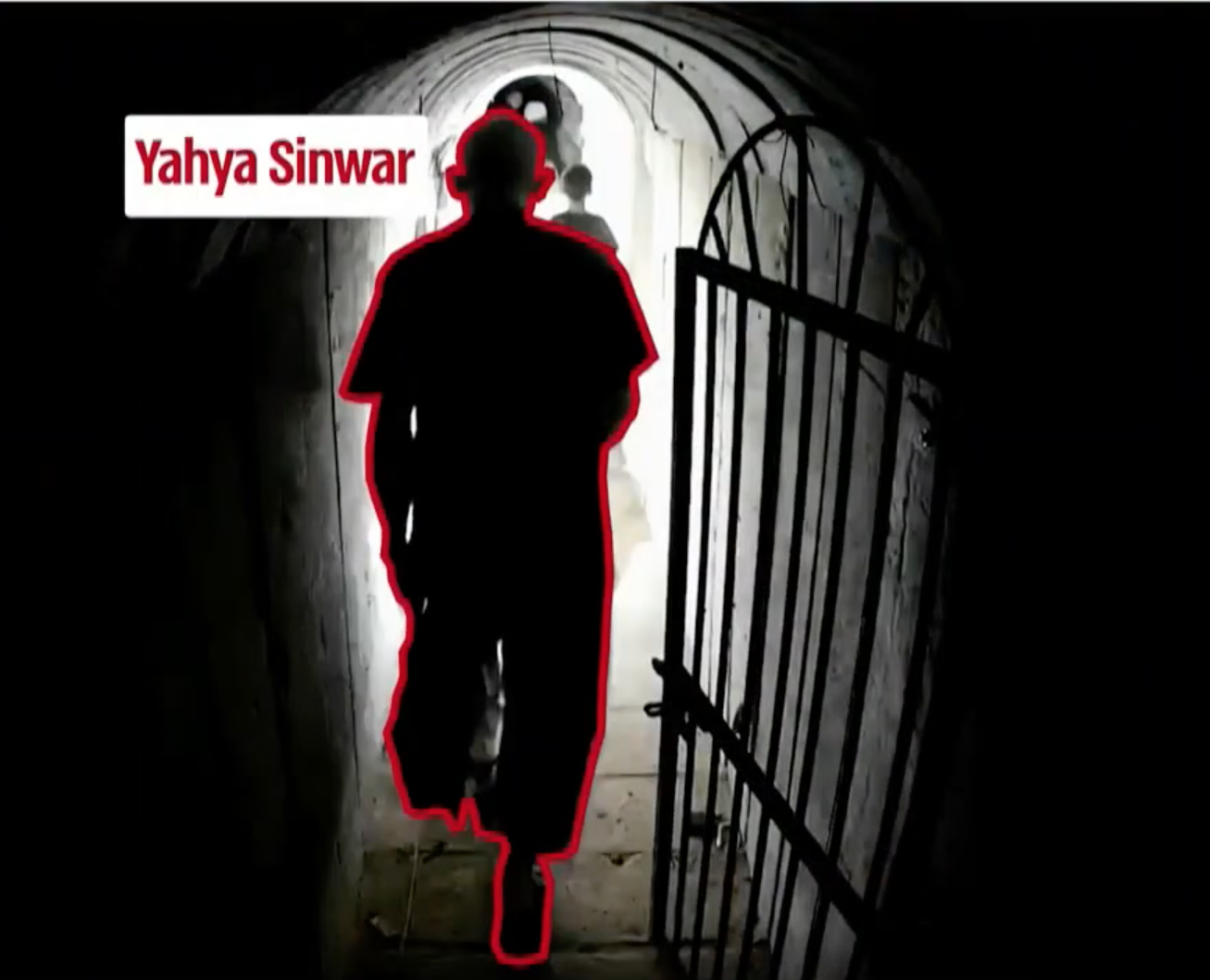Tunnels or shelters?
While Israel builds shelters for its civilian population and evacuates them from both the north and south, Hamas constructs tunnels for itself, embeds military infrastructure among civilians and prevents its population from fleeing war zones.

Hamas builds tunnels for itself and leaves the civilian population without shelters and warning sirens, leaving the Palestinian civilian population to rely on the Israel Defense Forces (IDF) to be forewarned when Hamas military installations are attacked. On February 13, the IDF released a picture of terrorist leader Yahya Sinwar taking refuge in Hamas terror tunnels. Photo: IDF
Israeli law requires all homes, residential buildings and industrial buildings to have shelters. These shelters have been critical in protecting Israelis from the 12,000 rockets fired from Gaza since October 7. Along with warning sirens and a costly and advanced anti-aircraft robotic system used to shoot down Gazan rockets, these shelters provide the public with safe and fortified rooms to hide in, which is why so few Israeli civilians are killed.
Hundreds of thousands of Israelis have spent a large number of days in shelters in recent months. Over 50,000 private shelters in Israel serve the needs of 1.3 million people along with additional publicly funded shelters.
Must rely on Israel
Having no warning sirens or shelters themselves, over two million Palestinians living in the Gaza Strip rely on phone calls, text messages and leaflets from the Israeli military to warn them of impending attacks.
Instead of building shelters, sewage and water treatment plants, improving old infrastructure, building schools and even creating beach resorts, Hamas builds tunnels.
A gigantic network of tunnels used as weapon storage, terror planning, smuggling and warfare with the aim of annihilating Israel exists under the Gaza Strip. Rather than provide Palestinians employment, electricity, food and running water, Hamas and its backers such as Qatar, Iran and Turkey have spent billions on tunnels and rockets with one goal in mind: killing Israelis while the organization’s leaders live a lavish lifestyle in luxurious villas by the Mediterranean.
Billions of dollars
The underground tunnel network provides Hamas and other terrorist groups with shelter and the capacity to store and hide weapons, to shift back and forth underground, communicate, train, carry out offensive attacks, transport hostages and retreat without being detected by Israeli or Egyptian authorities.
Hamas and Iran claim that the length of the tunnels amounts to about 500 kilometers. The system runs under refugee camps, private homes, hospitals and mosques. In November 2022, for example, the UN Relief & Work Agency (UNRWA) reported that they had found a tunnel under a primary school run by the agency.
On October 24, 2023, Hamas released 85-year-old hostage Yocheved Lifshitz, who described how she was made to walk for two to three hours through damp tunnels until she and other abductees reached a large hall. Lifshitz said that Hamas’s tunnel system resembled a “spider’s web”.
Tunnels and rockets
The largest known tunnel was discovered by the Israel Defense Forces on 17 December 2023. It has several branches, plumbing, electricity and communication lines where the longest branch stretched for about four kilometers at a depth of 50 meters underground in some places.
The network has its origins in the smuggling tunnels connecting the Gaza Strip with Egypt on both sides of Rafah since the early 1980s. The tunnels were dug into Egypt for trading and smuggling. The Israeli military estimated in 2014 that Hamas had spent between $30 and $90 million on 600,000 tons of concrete to build three dozen tunnels.
In August the same year Fox News described how Israel had destroyed 32 terror tunnels – each requiring the equivalent of 350 truckloads of construction materials and costing up to $3 million to build, according to the IDF.
In one of his last speeches in 2013 before resigning as president of Israel, Shimon Peres described Qatar as Hamas’ main financier. The Jerusalem Post reported that Peres “denounced Qatar, saying it had no right to spend millions of gasoline dollars to enable Hamas to build rockets and tunnels instead of developing Gaza.”



